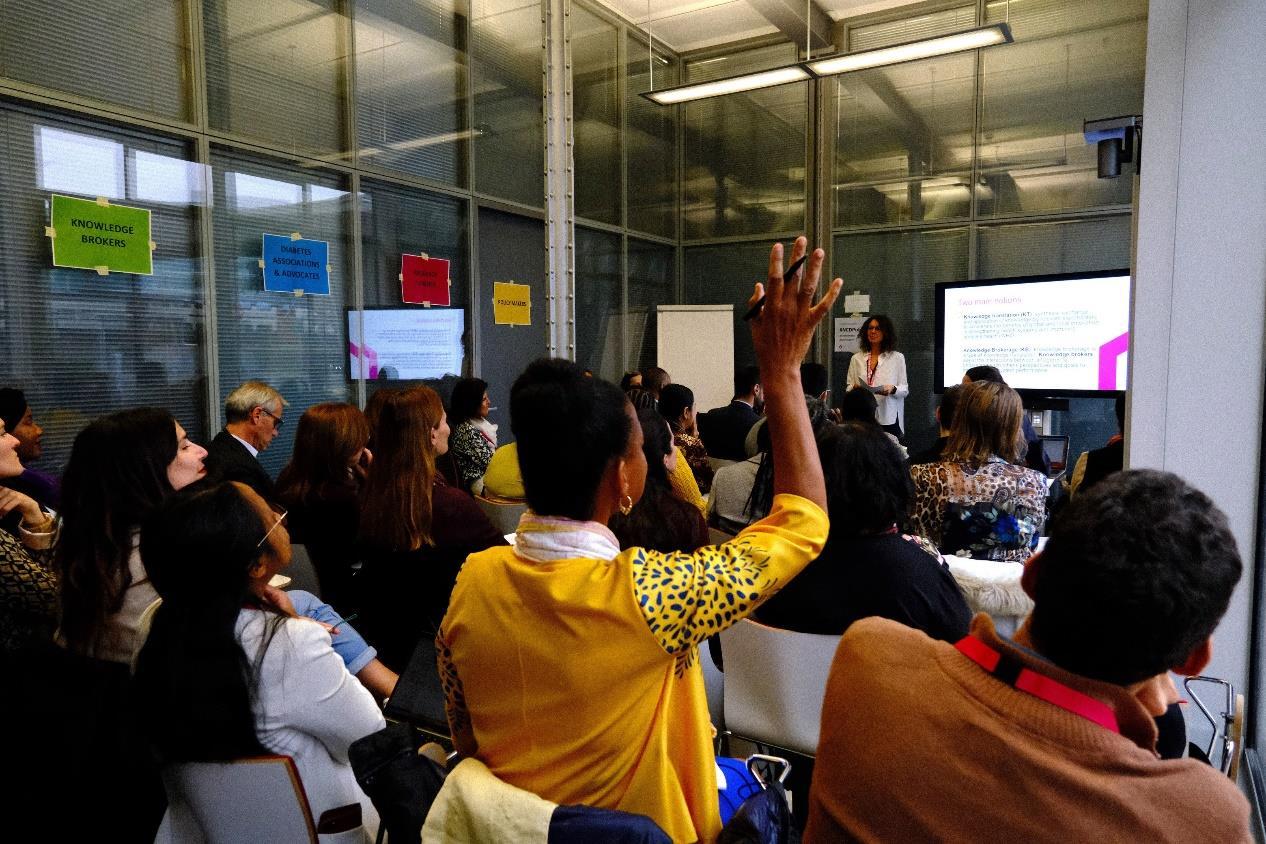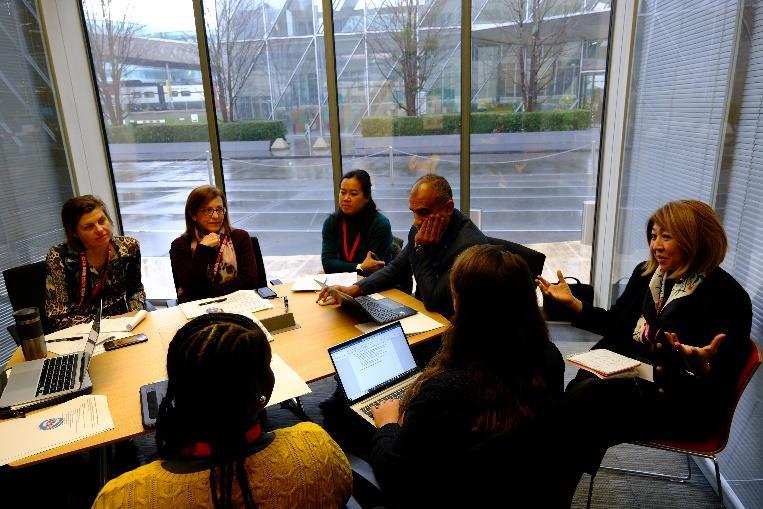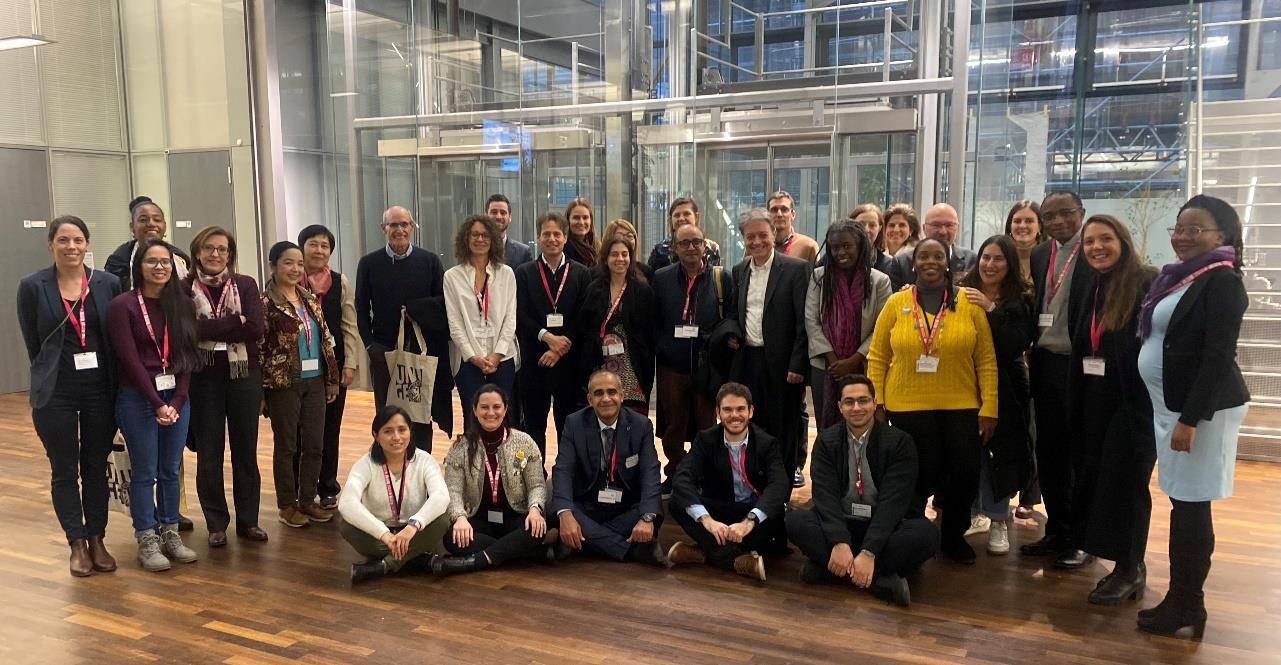Translation from Research to Policy: A focus on a global diabetes agenda
Organized by:
University of Geneva, Division of Tropical and Humanitarian Medicine, NCD Policy Lab and the Geneva Science-Policy Interface
With the support of the Swiss Agency for Development and Cooperation
Background
Globally much is known about diabetes. However, two overarching challenges exist. Firstly, there is a gap between scientific knowledge and policy and practice globally. The second challenge is that much of the knowledge coming from studies undertaken in high-income countries (HIC) often cannot be translated or transferred to low- and middle-income countries’ (LMIC) settings. This results in knowledge’ gaps as well as policy decisions being made based on experiences not adapted to LMIC contexts.
This gap is well known and was recognized by governments in 2021 with the adoption by the World Health Assembly (WHA) of Resolution 74.4 “Reducing the burden of noncommunicable diseases through strengthening prevention and control of diabetes” which includes in its text: “to strengthen monitoring and evaluation of diabetes responses, through country-level surveillance and monitoring systems, including surveys, that are integrated into existing national health information systems, and by identifying priority areas for diabetes research”.
The text of this Resolution represents an “ask” from World Health Organization (WHO) Member States to prepare a research agenda. Therefore, linkages are needed between WHO, researchers and policy makers to ensure that the process of prioritization of the research agenda is inclusive of views from different stakeholders, scientifically rigorous and relevant to policy makers. In addition to WHA resolution 74.4, one of the workstreams of the WHO Global Diabetes Compact seeks to identify knowledge gaps. These initiatives provide the foundation for the development of a diabetes research agenda.





With financial support from the Geneva Science-Policy Interface (GSPI), the University of Geneva in cooperation with the WHO and the University of Sydney have been collaborating on the development of a diabetes prioritized research agenda. In parallel to this work, the University of Geneva has carried out some key informant interviews to identify barriers to uptake of research in diabetes. This work identified a variety of challenges that the WHO prioritized research agenda will face in its implementation. This research also contributes to the development of activities for the NCD Policy Lab funded by the Swiss Agency for Development and Cooperation (SDC) hosted at the University of Geneva.
OBJECTIVES OF THE WORKSHOP
1. Present the current barriers to translating research to policy in diabetes.
2. Gain insight from various stakeholders to guide the translation of research to policy.
3. Help inform the WHO’s prioritized research agenda to ensure uptake by different audiences and policy makers.
4. Inform activities and approaches of the NCD Policy Lab at the University of Geneva.
EXPECTED OUTCOMES
1. Improved understanding of different barriers and solutions to increase uptake of diabetes research in policies.
2. Add to knowledge and help develop concepts to improve the science-policy interface.
3. Report on workshop to support use of research to inform diabetes policy.
This workshop took place on November 30th, 2023, at the Campus Biotech in Geneva and was hosted by the Division of Tropical and Humanitarian Medicine’s NCD Policy Lab with the support of the GSPI and SDC. The aim of the workshop was to bring together a wide range of stakeholders to have an openforum and use the collective intelligence in the room to provide concrete recommendations on how to improve national and international science-policy ecosystems.
Highlights from the event
Thirty-seven people, from more than twenty different countries and with a wide range of professional backgrounds participated and ensured rich discussions. Key challenges and opportunities were identified by the participants throughout the meeting
David Beran, Division of Tropical and Humanitarian Medicine, University of Geneva, Switzerland: “Although we talk about the diabetes agenda, the differences between type 1 and type 2 diabetes are such that these need to be considered from both the research and policy perspectives. Both are complex health issues and, although there is a need to simplify messages for policymakers, we as researchers should not shy away from this complexity, but rather work on how to communicate it. “
Grace Ku, Institute of Tropical Medicine Antwerp, Belgium: “The challenge with policy makers is that their agenda is often already dictated. It is difficult to add topics to their priorities Hence, they need to be involved from the start. “
Samih Abed Odhaib, Thi Qar Specialized Diabetes Endocrine and Metabolism Center, Iraq: “We need to understand what leads to action versus inaction by policy makers.”
Phil Riley, International Diabetes Federation, Belgium: “A significant challenge we face in our discussions with policymakers is the high turnover of the individuals charged with the responsibility of making and implementing policy. This rapid rotation disrupts continuity and fragments discussions. Frequently, it is necessary to take a significant step backwards or reinitiate discussions entirely ”
Rafael Bengoa, Former Minister for Health. Basque Government; Former Director Health Systems WHO, Spain: “Policy making is messy and other stakeholders need to realize this and manage this.”
Carlene Radix, Ross University School of Medicine and Organization of Eastern Caribbean States, Barbados: “Diabetes in some contexts has strong advocates. We are therefore not starting from zero and need to build on existing initiatives.”
Phyllisa Deroze, Founder of Black Diabetic Info™️ and Director of Content Strategy at dQ&A, USA: “We need to make sure that the voices of people with diabetes are heard. The lived experience needs to be put in the forefront to complement the professional perspective. Spaces need to be created for this to happen effectively.”
Maria Lucia Correa-Giannella, The São Paulo Research Foundation (FAPESP), Brazil: “Universities and academic institutions which host and support diabetes research should actively participate in the process of translating science into public policy. Universities do not seem to be aware of the importance of actively engaging or valuing the translation of science into policies. The institution carries more weight and appeal to policy makers than the scientist alone.”
PERSPECTIVES AND INSIGHTS FROM PARTICIPANTS:
The two questions posed to the participants are synthesized below using the European Commission Competence Frameworki The elements below provide suggestions from the workshop’s participants for improving the situation of getting diabetes on the policy makers’ agenda and for ensuring interactions opportunities between researchers and policy makers.
i https://knowledge4policy.ec.europa.eu/visualisation/competence-framework-‘science-policy’researchers_en.
Five elements
Understand Policy
Participate in Policymaking
Questions posed to participants: How to …
Get diabetes on the agenda
• There is a need for translation of research into formats and language adapted to policy makers.
• Capacity Building is needed for Researchers and Policy Makers.
• Focus on the local: data; mapping of context; and policy makers.
• Define what policy makers need to know.
• Create policy recommendations as an integral part of scientific articles.
• Ensure involvement of people with lived experience.
• Involve technical advisors (“the Middle Man/Woman”) rather than high-level policy makers.
Foster exchanges between policy makers and researchers
• Knowledge translation platforms are key to understand how political agendas are defined.
• Concrete solutions and recommendations should be laid out for policy makers.
• Researchers need to adapt the language to ensure understandability and policy action.
• Need for different evidence to be presented to policy makers.
Communicate
Engage with citizens & stakeholders
Collaborate
• Learn from other diseases such as HIV or cancer on what role advocates and activists can play.
• Include journalists for dissemination.
• Include people with high influence (writers, actors, singers) and involve them as communicators of key messages.
• Use existing coalitions to push for change.
• Address the research gaps according to local context.
• Ensure co-creation and co-production with different stakeholders to ensure ownership of the research results. Include policy makers from the beginning.
• Highlight intersectoral approaches needed to address diabetes.
• Importance of a Stakeholders Mapping.
• Work with local stakeholders and ensure that the right stakeholders are involved.
• Create Interagency Groups and have regular meetings with the government.
• Science is a tough language, train researchers in communication skills.
• Include journalists in these interactions.
• Ensure frequent interactions.
• Organize informal platforms where researchers and policy makers can interact.
• Involve the younger generation to provide a “fresh view” and the need for change.
• People with lived experience should be involved.
• Include Policy Makers since the beginning and ensure regular meetings.
• Workshops and events involving all parties to discuss and find solutions together and fostering interactions.
Take-home messages and next steps
From each participant constituency group (Knowledge brokers; Advocates & Diabetes Associations; Research Funders; and Policy Makers) provided clear take-home messages, which are presented below.
Knowledge brokers:
• “Make the research tangible”,
• “Make research relevant to national contexts – collect local data by keeping in mind the global agenda”,
• “Being here for science to be changed into something valuable for societal relevance – the need to move beyond generation of new knowledge”,
• “Key messages and precise solutions”,
• "Publishing is a request for academics and is often not directed to Policy Makers".
Advocates & Diabetes Associations:
•“Nothing about us without us – need to be invited to the table”,
•“Knowledge translation platforms are key in order to act as a messenger”,
•“Think in headlines and learn to communicate”,
•“Give us the data to make the case for change”.
Take-home messages
Research Funders:
•“Make it mandatory to involve policy makers in funding proposals”,
•“Oblige researchers to present their results to policy makers”,
•“Measure the success of grants based on the uptake/involvement of/by policy makers”,
•“Create opportunities/grants for scientists and policy makers to work together.”
The next steps for this work will be:
Policy Makers:
•“Tell us how to implement and give us key numbers we can use for advocacy”,
•“Identify the right people to inform and the right language”,
•“Policy Makers should admit they need help”,
•"Use the word "chronic" with policy makers vs noncommunicable diseases".
1. Integration of these findings into the qualitative part of the WHO Diabetes research agenda final report.
2. Launch of the WHO Diabetes research agenda in 2024.
3. Ongoing thinking and engagement of different stakeholders to address some of the challenges and solutions identified during this workshop.
Appendix – List of participants
Name of the participant
Workshop Group
Affiliations
Country
Beatriz Yanes Jimenez NGO International Diabetes Federation Spain
Beatrice Vetter NGO FIND, Director, NonCommunicable Disease Programme Switzerland
Priyanka Singh NGO FIND, Scientist Switzerland
Bianca Hemmingsen UN Agency WHO, Medical Officer, Department of Noncommunicable Diseases, Rehabilitation and Disability Switzerland
Carlene Radix Policy maker
Lori-Ann Henri-Johnson Policy maker
Ross University School of Medicine Organization of Eastern Caribbean states Barbados
Ministry of Health, Wellness & The Environment, Antigua & Barbuda Antigua & Barbuda
Carol Abidha Diabetes advocates Heidelberg University Hospital Kenya
Gojka Roglic UN Agency Consultant, World Health Organization Switzerland
Grace Ku
Researcher/Im plementer Institute of Tropical Medicine, Antwerp The Philippines
Martin Leschhorn NGO Medicus Mundi Switzerland Switzerland
Morven Roberts Research funder Global Alliance for Chronic Diseases (GACD) UK
Phyllisa Deroze Diabetes advocates Black Diabetic Info™️ and dQ&A USA
Pradip Lamsal
Researcher/Im plementer Helping Hands Community Hospital, Kathmandu, Nepal Nepal
Rafael Bengoa Policy maker
Former Minister for Health. Basque Government; Former Director Health Systems WHO. Spain
Robert Morton Research funder Novo Nordisk Foundation Denmark
Samih Abed Odhaib
Researcher/Im plementer
Thi Qar Specialized Diabetes Endocrine and Metabolism Center, Iraq Iraq
Siriwan Pitayarangsarit Policy maker Ministry of Public Health, Thailand Thailand
Stéphane Besançon NGO Santé Diabète NGO Mali
Daisy Lanvers UN Agency UNDP France
Mohammed Seyam Diabetes advocates T1International Palestine
Manolis Karamalis
Vannessa Peberdy
Marta Koch
Bruno Helman
NGO/Private Sector IFPMA Switzerland
NGO/Private Sector IFMPA Switzerland
Knowledge broker The Lancet Diabetes & Endocrinology UK
Diabetes advocates International Diabetes Federation Spain
Baktygul Akkazieva Knowledge broker WHO EURO Kyrgyzstan
Diana Novelo
Maria Lucia CorreaGiannella
Diabetes advocates Asociación Mexicana de Diabetes en el Sureste A. C Mexico
Research funder The São Paulo Research Foundation, FAPESP Brazil
Phil Riley NGO International Diabetes Federation Belgium
Elsa Morandet
Andre Pascal Kengne
Frédérique Guerin
Mialy Rann
Marina Giachino
Research funder World Diabetes Foundation Denmark
Research funder South African Medical Research Council South Africa
Organizers / Coordinators GSPI Switzerland
Organizers / Coordinators GSPI Switzerland
Organizers / Coordinators HUG/UNIGE Switzerland
Janeth Tenorio Coordinators UNIGE Peru
Olivia Heller Coordinators HUG Switzerland
Jessica Zafra Coordinators UNIGE Peru
David Beran
Organizers / Coordinators UNGE Switzerland














